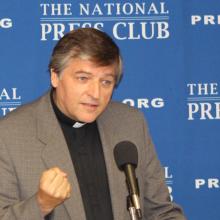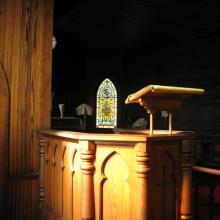Women's Ordination
“It is not my practice to censor the invitations to campus from any of our theological centers or student organizations,” Barnes said in a letter addressed to the seminary community. “Yet many regard awarding the Kuyper Prize as an affirmation of Reverend Keller’s belief that woman and LGBTQ+ persons should not be ordained… In order to communicate that the invitation to speak at the upcoming conference does not imply an endorsement of the Presbyterian Church in America’s views about ordination, we have agreed not to award the Kuyper Prize this year.”
MANY KNOW Benedictine Sister Joan Chittister as a prophetic spiritual writer and an engaging speaker; others call to mind her sister-leadership, her feminism, and her defiance of the Vatican. What Tom Roberts’ startling new biography uncovers, with the full cooperation of Sister Joan, are the horrors of a childhood filled with violence and poverty and the vivid details of her growth as a spokesperson for women’s equality in the Catholic Church.
The book’s three parts each deal with a phase in Chittister’s spiritual growth. The early years, with harrowing accounts of protecting her mother from a brutal and alcoholic stepfather and entering an Erie Benedictine community still steeped in old-world traditions, conclude with Chittister receiving her Ph.D. from Penn State, a first for her order.
Part two chronicles the tumultuous middle years when religious communities everywhere were adapting to a radically changing world. Chittister grew in critical consciousness about the role of women in the church and served three terms as prioress of her order, helping her community to move from its traditional vocation of teaching to serving a changing neighborhood. Their projects, under the umbrella term of peacemaking, took the form of urban gardens, art workshops, afterschool programs, peace centers, houses of hospitality, and soup kitchens, and eventually to the formation of online communities of monastic spirituality. For those who haven’t read Chittister’s own writing on these years, Roberts could have included more information on pre-Vatican II convent life here.
Part three finds Chittister moving beyond the community of U.S. sisters to worldwide leadership, ably assisted by her lifelong friend Sister Maureen Tobin. Chittister traveled on peacemaking journeys to Palestine and Israel, worked in Haiti and the Philippines, and took part in several worldwide conferences, including the 1995 U.N. World Conference on Women in Beijing and an ecumenical conference in Nairobi. All this while still plagued by the ravages of childhood polio!
In 2001, Chittister was invited to speak at the first international conference of Women’s Ordination Worldwide, to be held in in Dublin. Vatican officials ordered her prioress, the late Christine Vladimiroff, to “forbid and prohibit” Chittister’s participation. Roberts details the courage of Vladimiroff and the community as they collectively resisted the Vatican in support of Chittister.
When Chittister addressed the Dublin conference about discipleship, she asked “What do the people really need?” answering that “they need the sacred, not the sexist ... more prophets of equality, not more pretenders to a priesthood of male privilege. They need discipleship, not canonical decrees.” In her assertion that Christian discipleship will, sooner or later, “tumble a person from the banquet tables ... to the most suspect margins of both church and society,” she foreshadowed some of Pope Francis’ wisdom. She begged that the question of women as priests be seriously considered in papal circles, lamenting that it had not yet happened. (It still has not yet happened.)

Image via Eric Thayer / REUTERS / RNS
Women who would be Orthodox rabbis were handed a major setback Oct. 30 when the highest religious body for Modern Orthodox Jews ruled against their ordination.
The Rabbinical Council of America officially prohibited the ordination of women, or the use of the term “rabbi” or “maharat” for women, in what it described as a direct vote of its membership.
The prohibition comes six years after the founding of a yeshiva, or religious school, for women in New York City. The school, Yeshivat Maharat, has ordained less than a dozen women who use the honorific “maharat” instead of rabbi and has placed graduates and interns at 17 Orthodox synagogues in the U.S. and Canada.

Image via Villiers Steyn/Shutterstock.com
Some male pastors of the Seventh-day Adventist Church have changed their credentials in an act of solidarity with women who are not allowed to be ordained in the denomination.
The protest has occurred in several states across the U.S. after the global denomination voted in July not to allow regional church bodies to ordain women pastors.
Despite a worldwide ban, several U.S. conferences of Adventists have ordained women in recent years. But usually women may only hold a “commissioned” credential without being formally ordained.

Volt Collection / Shutterstock
In an interview that aired last week, Stephen Colbert — possibly the only Catholic whose popularity rivals Pope Francis himself — admitted that one of the times the Eucharist felt “most real” to him was when he attended an Anglican service and heard a woman consecrate the bread.
“The freshness of hearing a woman say that gave the message a universality that it always should have,” said Colbert.
Today, if you walk through the red doors of an Episcopal church on Sunday morning, the person presiding over the Eucharist might be female, gay, lesbian, bisexual, or transgender. But on Sept. 12, some of the first women ordained as Episcopal priests reminded the church: it hasn’t always been that way.
Forty years ago last week — before women were allowed to be priests — four women were "irregularly" ordained as Episcopal priests before the altar of St. Stephen and the Incarnation in Washington, D.C. Closely linked with the "irregular" ordination of eleven women in Philadelphia (the “Philadelphia Eleven”) the previous year, the ordination of the Washington Four — Lee McGee Street, Alison Palmer, Betty Powell, and Diane Tickell — is seen by many as a key step in securing women’s ordination in the Episcopal Church.
Seventh-day Adventists opted for a middle-way approach on the divisive issue of women’s ordination on Oct. 14, kicking the question to next year’s worldwide meeting without taking a firm stance either for or against women’s ordination.
Next year’s debate will come nearly 100 years after the death of Adventist matriarch Ellen White and could settle decades of disagreement over whether women should be allowed to be ordained in the 18 million-member church she co-founded.
The church’s Annual Council voted to refer the matter to the 2015 General Conference Session in San Antonio. Under the proposal, regional church bodies would be able to decide whether to ordain women pastors.
The Church of England’s vote to allow female bishops threatens unity with the Catholic Church, according to the editor of the Vatican newspaper, L’Osservatore Romano.
Giovanni Maria Vian, who is also a Rome historian, on Tuesday said the decision would have “an extremely negative impact” on steps to bring the churches closer together despite a positive meeting between Archbishop of Canterbury Justin Welby and Pope Francis a month ago.
“Clearly it’s a decision that complicates the ecumenical path,” Vian said in an interview with the Italian newspaper La Stampa published on Tuesday. “The problem is not only with Rome but also with Orthodox Churches, and that the Anglican Church is itself divided on the issue.”
After nearly 20 years of debate, the Church of England’s General Synod voted Monday to permit women priests to be ordained as bishops, overturning centuries of tradition in a church that has been deeply divided over the issue.
An Austrian priest who’s been banned from speaking at Roman Catholic churches during his three-week U.S. tour said Pope Francis could be an ally in reforming the Catholic Church, but said it will take more than the pope to open the priesthood to married men and women.
The Rev. Helmut Schuller, founder of the Austrian Priests’ Initiative, has been drawing crowds of several hundred people with his call for greater participation from the church’s lay “citizens” and a married priesthood.
“We are trying to open the church to a real approach to modern society,” Schuller said Monday in a speech at the National Press Club. “There are a lot of questions to our church in these times, and the answers are really old-fashioned.”
Pope Francis and Archbishop of Canterbury Justin Welby will meet in Rome on Friday for the first time since the two men took office in March.
Francis was inaugurated as the head of the world’s 1.2 billion Roman Catholics on March 19, while Welby officially took over as Archbishop of Canterbury and spiritual leader of the 77 million-member Anglican Communion on March 21.
Some hope the meeting could put Anglican-Catholic relations on a firmer footing.
Pope Francis on Wednesday said women play a “fundamental role” in the Catholic Church as those who are mostly responsible for passing on the faith from one generation to the next.
While the new pope stopped far short of calling for women’s ordination or giving women more decision-making power in the church, his remarks nonetheless signaled an openness to women that’s not often seen in the church hierarchy.
“In the church and in the journey of faith, women have had and still have a special role in opening doors to the Lord,” the Argentine pontiff said during his weekly audience in St. Peter’s Square.
I’ve attempted to catch some of the Republican National Convention last week and this week’s Democratic National Convention. Some of it has been educational, others infuriating, others confusing, and still, others very inspiring.
I am listening and watching as I want to be more deeply educated and informed so I can steward the privilege of voting with care, prayer, and discernment. But thus far (and I know that the DNC has just gotten underway), one clear observation for me from both the RNC and DNC has been the amazing voices, words, leadership, and speeches from…the women.
The three that obviously stood out for me were the speeches delivered by Ann Romney, Condoleezza Rice, and Michelle Obama. Ann’s speech was heartfelt and compelling. Condoleezza’s speech was inspiring and dare I say it…”presidential.” And wow, Michelle Obama’s speech was simply riveting. I found myself in tears on couple occasions during the FLOTUS’ speech.
As I soaked in the inspiring speeches from these women, I was mindful of the incredulous fact that the 19th Amendment to the American constitution — allowing women to vote — only took place in 1920. Just 92 years ago and with that, America became just the 27th country to support “universal suffrage.”
Without any offense intended to others — especially the male speakers — their speeches were the clear highlights. I don’t care what others will do or say during the DNC from here on out, no one is going to top the speech delivered by Michelle Obama.
But this isn’t my attempt to say that women are better than men, more articulate than men, more intelligent than men, or any other nonsensical comparisons. Rather, I want to simply communicate how incomplete the conventions would have been without their voices, words, challenges, and exhortations.
Imagine if only men were allowed to speak.
Two U.S. regional groups of the Seventh-day Adventist Church have recently approved the ordination of women pastors, moving faster than the worldwide church’s study of the issue.
The Pacific Union Conference, which includes California and four other Western states, voted 79 percent to 21 percent at a special session on Aug. 19 to “approve ordinations to the gospel ministry without regard to gender.” Weeks earlier, the Maryland-based Columbia Union Conference, which includes eight Mid-Atlantic states, adopted a similar change in its policy, with 80 percent in favor.
World leaders of the church – who appealed for unity before the votes were cast – said they were disappointed with the conferences’ actions. They said the Columbia Union’s July 29 action was “not in harmony” with the general policy of the church, and said the Pacific Union would “preempt the collective decisions of the world church regarding ordination.’’
Leaders of the Maryland-based Seventh-day Adventist Church, which is best known for observing the Sabbath on Saturday instead of Sunday, are in the midst of studying the “theology of ordination” for possible consideration at their 2015 General Conference Session.
In light of some recent intense posts - Ultimate Fighting Jesus and Conversation with Rob Bell (re: women in ministry), this list is too funny not to share.
But the brutal fact is that the matter of gender violence isn’t all that funny either. Statistics about gender inequality via UN and UNICEF are even more discouraging.
Regardless where you sit, stand, or wrestle with the issue of women in church leadership, I thought this satirical list was worth sharing for both laughter and even reflection because that’s what good satire forces us to do. And for what it’s worth, I’d encourage you to read some of my thoughts about why I believe women should be included in all levels of church leadership.
[Regarding "Rocking the Boat," by Rose Marie Berger, March 2007] I have no calling to the priesthood, but I know some women who certainly seem to.
I TAKE ISSUE with Joan D. Chittister's article "A Dangerous Discipleship" in the January-February 2002 issue.
THE ARTICLE ON discipleship ("A Dangerous Discipleship," by Joan D. Chittister, OSB) was good, but why do we think so small?
The Church of Pakistan has ordained its first two women deacons, despite civil court action by a breakaway church that believes the Bible bans women from the clergy.
For many Christian churches, having women in pastoral leadership is the norm. For a Catholic parish in New York, it’s apparently a firing offense.








